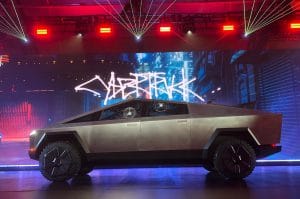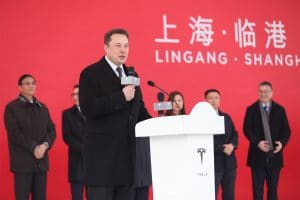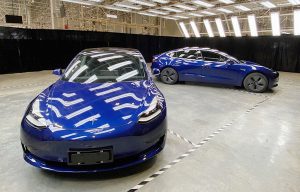Barely two weeks ago, Elon Musk cracked a marijuana joke as Tesla’s stock surged to $420 a share – that number a long-time doper’s slang for weed. He’ll have to come up with another way to celebrate what’s happened since then, hitting a peaks of nearly $500 a share before settling back ever so slightly.
Tesla shares have been on fire, Wall Street investors betting that the automaker had solid fourth-quarter deliveries and will push even further in the New Year now that it’s fired up its new plant in Shanghai. At its current price, the market effectively thinks Tesla is worth more than General Motors and Ford combined.
(Tesla worth more than GM and Ford combined?)
But Tesla has always remained a controversial bet, a chart of its share price frequently resembling a rollercoaster. And while some analysts expect the stock to continue its ascent, not everyone is so upbeat – including several Tesla bulls who think shareholders might want to pull the plug on the EV automaker.
Among the most notable is Baird analyst Ben Kallo who has effectively shifted his view on Tesla from Buy to Hold. The stock has been in “plaid mode,” Kallo wrote to investors, a reference to a super high-performance mode from the Mel Brooks movie, “Spaceballs.” (CEO Musk has borrowed from the film for Tesla’s current “Ludicrous Mode,” and will introduce an even faster “Plaid Mode” on its upcoming Roadster.)
“After several years at an Outperform rating, which included contentious arguments with—evidently—high-conviction bears, we recommend profit-taking,” Kallo wrote in a research report. “While we remain constructive on (Tesla’s) long-term prospects, we now believe estimates are properly calibrated—particularly on the buy-side—and valuation appears more balanced.”
Kallo isn’t the only one questioning whether Tesla can continue what one analyst called a “meteoric” run-up that has seen shares double in price over just the past three months.
Wall Street firm Baird took a similar viewpoint in its own report on Thursday, downgrading Tesla from Outperform to Neutral, essentially an advisory to sit back and hold shares while waiting to see if Tesla will have another one of its wild swings.
But some trackers are starting to be put off by Tesla. While Bernstein’s Toni Sacconaghi didn’t revise his target price guidance or issue specific recommendations, he sounded anything but bullish when telling investors, “We have become incrementally cautious on the stock, given its huge recent surge in price.”
Garrett Nelson, an analyst with CFRA, had already rated TSLA a Hold, and he is now downgrading that to Sell, advising investors in his own report, “In our view, (Tesla) shares now appear fully valued after a meteoric run-up since bottoming at $177/share last June and are not reflecting various near-term risks.”
(CEO Musk says Tesla to build new Gigafactory near Berlin)
He pointed to several, including the cost of adding a third plant near Berlin, something that could eat up as much as $5 billion in cash. But there are other concerns that investors and analysts are watching:
· It is still unclear whether Tesla will run into problems as it ramps up production at the Shanghai plant – though it clearly avoided what Musk dubbed the “production hell” experienced at its California factory during the launch of the Model 3;
· China, the world’s largest market for EVs, has seen an unanticipated slump in demand for electric vehicles – and autos, in general – that could pose problems for Tesla;
· While most observers expect U.S. sales were relatively strong during the fourth quarter, Tesla lost all federal sales incentives as of January 1, which could force it to cut prices or risk a slide in demand.

Tesla will be launching plenty of new products, including the Model Y SUV, its big Semi, the second-generation Roadster and the Cybertruck shown here.
(China’s annual New Energy Vehicle sales declined in 2019. Now what?)
“With (Tesla’s) market cap now exceeding General Motors Co. and Ford Motor Co. combined despite having only about 3% of joint vehicle sales volume, we think investors have given (Tesla) plenty of credit for future growth, raising execution risk,” Nelson said.
There remain some clearly bullish analysts, both Argus Research and Credit Suisse raising their own targets earlier in the week.
Largely based on China, Piper Sandler set a target of $553 a share, advising investors that, “if Tesla’s Model 3 market share in the United States can be replicated in China – and if this logic extends also to Model Y – then Tesla’s annual volume in China alone would eventually exceed 650k units. We’re not sure Tesla can immediately replicate its U.S. success in China (due to the strength of German brands in China), but we are increasing our estimates nonetheless.”
Some would question the potential for Tesla to dominate the Chinese market, and for a variety of reasons. Among other things, there are dozens of EV manufacturers there, including reasonable successful local brands like BYD and Nio, that could fight harder than we’ve seen in the United States.
Meanwhile, 2020 could be a year where Tesla really gets tested in the U.S., what with the upcoming launch of an assortment of new competitors, including Volkswagen with its ID.4, Porsche with the Taycan and Ford with the Mustang Mach-E.
So far, none of the supposed “Tesla killers” has gained any real traction, but the increasing array of competition shows that mainstream manufacturers are gearing up for a bigger fight, even as other start-ups, such as Rivian, Byton and Farraday Future, get ready to blitz the market on their own.


